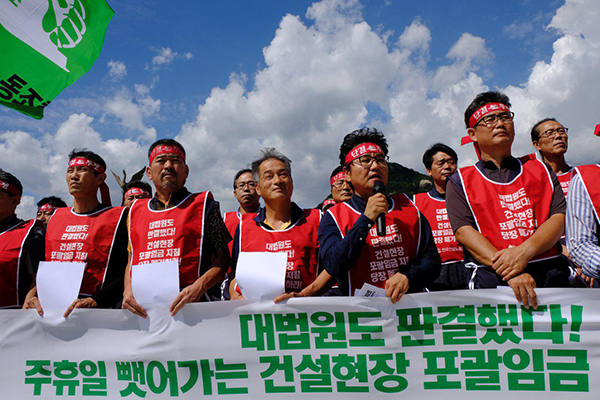
July this year, Ms. Kim Min-gyeong(alias) had a job interview with a design firm in the area of Seoul. In the job interview, the firm asked her if she could accept a job with "a lot of night-work". She thought to herself that the job offer was not so bad, given the annual wage of 20 million won(US$18,000) the firm suggested to her and signed the employment contract.
It was true that, as explained in the job interview, the firm had a lot of night-work, but she found it too many. It was not unusual that she worked until midnight, and there was even a case that she worked until 4:30 at dawn. She demanded the firm to pay her the allowances of overtime and night-work. However, the firm replied to her that "as the signed employment contract is clearly subject to the comprehensive wage system, the (claimed) allowances need not be paid."
With a help provided by Workplace Gapjil(roughly translated as 'unjust treatment at work') 119, a civic organization consisting of public labor attorneys and lawyers, a petition for her grievances was lodged with the Ministry of Employment and Labor which enforced the firm to pay her the unpaid overtime allowance amounting to 3.13 million won(US$ 2,800).
Workplace Gapjil 119 looked into her timecard record and found out that Ms. Kim worked the overtime of 261 hours and 49 minutes for the past 22 weeks from her entry to the firm in July until November. Of 22 weeks excluding only one week, she worked more than 40 hours a week, and for 9 weeks she worked exceeding 52 hours a week, which infringes Article 53-1 of the Labor Standards Act which restricts the extended work up to 12 hours a week. As the firm did not pay her additional allowances for overtime and holiday work, the firm also infringed Article 56 of the Labor Standards Act which regulates an employer to make an additional pay of 50 percent or more of the ordinary wage for the overtime work, night work and holiday work.
However, suppose that the design firm for which Ms.Kim worked had introduced the flexible working hour system, the number of law violations would be drastically reduced. In accordance with Article 51 of the Labor Standard Act regarding the flexible working hour system, when a firm introduces the flexible working hour system in rules of employment, the firm can have the employees work on condition that average working hours per week do not exceed 40 hours for a unit period of two weeks, which allows the employees to work up to 48 hours a week for a specific week. If 12 extended hours of work were added to the weekly 48 hours incurred by the flexible working hour system, it would be possible for the firm to have Ms. Kim work up to 60 hours a week.
According to Workplace Gapjil 119, when Article 51 of the Labor Standards Act applies to the case of Ms. Kim, the period that the firm breached Article 53 of the Labor Standards Act decreases from 9 weeks down to 3 weeks. If the 3-month unit period of the flexible working system is applied, the charges on law violations will further diminish.
When an employer reaches an agreement in writing with a workers' representative on the flexible working hour system with a unit period of 3 months on condition that average working hours per week do not exceed 40 hours for a unit period of 3 months, workers shall work up to 64 hours a week: 52 hours for a specific week with an additional 12 hours for a specific day of the week.
When Ms. Kim's working hours are computed in accordance with the unit period of 3 months, the period that the firm violates the Labor Standards Act shrinks with only 1 week, a drastic decrease from 9 weeks.
Overtime allowance is only paid for extended hours of work, exceeding 48 hours in the flexible working hour system with a unit period of two weeks, and exceeding 52 hours in the flexible working hour system with a unit period of three months, on condition that average working hours per week do not exceed 40 hours during a given unit period.
In case of Ms. Kim, she worked more than 40 hours a week for 22 weeks since she started to work, except one week. Because of this, if the flexible working hour system were to be introduced in the firm, she is still entitled to receive the overtime allowance.
However, the outcome will turn out to be very different if a unit period of the flexible working hour system is extended to 6 months or 12 months as pursued by the government and the political circle. The longer a unit period is extended, the smaller the allowances will become for the workers who are subject to the comprehensive wage system.
reported by Kim Hak-tae
translated by Kim Sung-jin

